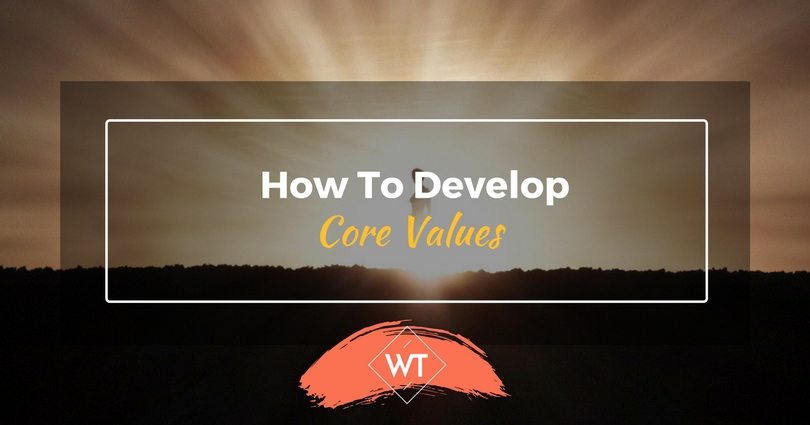How To Develop Core Values

Your beliefs become your thoughts. Your thoughts become your words. Your words become your actions. Your actions become your habits. Your habits become your values. Your values become your destiny. ~ Mahatma Gandhi (Tweet this)
Our true self is never born and never dies; it is full of potential and different from the self-image we create. When we are first born into these bodies we bring with us this infinite potential, which is used to create our self-images through our values, experiences and ideas.
This self is developed over a lifetime. All of our lives we are developing our potentials. It is perhaps the most creative activity of life.
Examples of these potentials are the skills and talents we develop; such as learning to play an instrument or ride a bike. Yet, by far the most valuable potential lies deep inside of us. It is the awareness of awareness itself, it is our true self.
As we develop core values we refine our purposes and establish a principled guidance system for staying in tune with our true self, our highest potential.
My values, our values, aren’t about pointing fingers. They are about offering a helping hand. ~ Kathleen Blanco (Tweet this)
What Are Core Values?
Most of us are familiar with basic core values by their names: integrity, trust, honesty, compassion, self-reliance, reverence, loyalty, and courage as they are spoken of frequently. However, how many of us have turned these words into personal realities? Better yet, how many of us actually know what qualifies as a core value?
Core values are the basic ethics of the spirit. They work as an ethical compass, in which we have the opportunity to be open or withdraw and keep a hidden agenda. When firmly established, core values prevent us from being victims to circumstance. There is no sense of failure when you possess values that endure external crisis.
Why Core Values Matter?
Only with strong core values can we pursue the creative act of creating a self. It is from our core values in which we can wisely choose to cultivate our truest potentials. Many claim to understand their own values, but in my experience, we don’t really know them until they are:
- Expressed clearly in writing.
- Established through on-going experience.
Much like company core values, personal core values are guides for behavior and choice-making.One of the main reasons we struggle with decision-making is a lack of clear core values—make them precise and decision-making is effortless. If we fail to make our values clear or ambiguous we are left in constant wonder as to how to live wholesomely.
The purest of souls will share basic core values; but they are more like a guide on whether to be ethical or not—to be open or keep a hidden agenda. Personal core values, on the other hand, may not exactly match another’s. However, they help you determine your surrounding culture.
You are the average of the 5 people you surround yourself with. ~ Jim Rohn (Tweet this)
Intelligent people use personal core values to select their partnerships—personal and business. Core values also help to wisely handle personal resources, such as time and money.
Personal Core Values Exercise
To develop core values you are going to need to look inward for answers. I find nothing better than a basic notebook, a pen, and a quiet space—free of distractions—and at least an hour to reflect.
This may take several sessions, so don’t feel pressured. Stressing or straining to produce answers here will only lead to faulty results.
Step 1
Take a journal and answer the following questions to your best ability:
- What are some your most proud achievements?
- When do you feel you’re living your highest potential?
- What are common themes in your answers?
Step 2
Next, answer the following questions:
- What are some of your least proud moments?
- In what moments do you feel insufficient?
- What are common themes in your answers?
Step 3
Based on these commonalties
- What advice can you give yourself?
- Are you seeing where you suppress your greatness?
- And for what reasons?
- Are you seeking validation and approval? Be your own support team and create a statement of internal motivation to live your potential.
Step 4
Next, refine your motivational statement to just a couple of words. For example: perhaps your advice is: “Be more aware when eating, don’t settle for less than optimal food choices.” Reduce that down to “Optimal diet and mindful eating.”
Step 5
Lastly, it’s time to take your values and put them into doings. A value is worthless if it’s just a thought without inspired action. By taking action on our values we can find out if they are the most helpful. To do this, think of a possible scenario where your core value is potentially harmful.
For example, if your values are rooted in optimal health then put yourself in a situation where you are choosing dinner. Are your food choices nourishing you on a holistic level? How is your diet affecting not just your physical body, but your relationships, your finances and your mentality. It wouldn’t be wise to choose a diet that only satisfies your belly, but causes financial and emotional stress.
You have to think it through carefully and see where one value might not be particularly suiting. Don’t overthink this. The point of this is to challenge the value with honesty to better refine it. If you can’t identify a legitimate case where the value steers you wrong, you probably have a clear core value for this time in your life.
In general, developing core values is a process that requires honest reflection and focused time. I recommend doing it alone, preferably in the morning when your mind is more clear. After this morning reflection—where you will get your most honest answers—try sharing them with someone you trust to be honest. This way you can get feedback, which will help you see blind spots. You can offer to do the same for your friend, with both of you now helping each other.
This works because our relationships are powerful mirrors that often show us what we typically ignore. It may require several discussions over weeks or even months. Your values may adjust and develop over time just as you do, so embrace the change.
Staying Centered
Core values ultimately help us find our center in the midst of a chaotic world. Being centered keeps us grounded in our true selves. No matter how tumultuous the environment may seem, we feel serene.
When we are centered we know there is nowhere to go to be free and safe—we dwell in our very being.We learn that existence is out of our control; however, being is always within our control. Allowing us to let go and enjoy the present.
We know we are centered when we no longer need validation from the outside world, nor do we need approval from others. To be centered is to be self-determined, and is the greatest reward of a spiritual journey.
There is no secret potion to enlightenment however. It comes only after confronting the unknown; taking responsibility for ourselves and having the courage to maintain ethical core values each moment. One of the only truths with longevity is change. Change is the only constant. When we resist this natural process of life we suffer and cling.
When we find ourselves unwilling to change we stifle the process of life—growth. We stop living presently and instead react from old conditions of the reactive mind. A reactive person eventually loses their zest for life.
Without our basic values intact we are not centered enough to begin building a self. Instead, we end up in reaction mode, trying to control every little thing in life all the while life is passing us by.
This is the mindset of a victim, not a creator. Victims feel helplessly out of control, because they are unwilling to control their own thinking and choices. Circumstances are controlling them and they are trying to control those circumstances, rather than controlling themselves—their core values, their views, and their responsibilities.
With strong core values and a connection to our center, we can truly begin to appreciate life as a gift; even the worst days provide something beneficial. If you wish to create a truly charmed life, start by making the choice to be ethical.









Leave a Reply